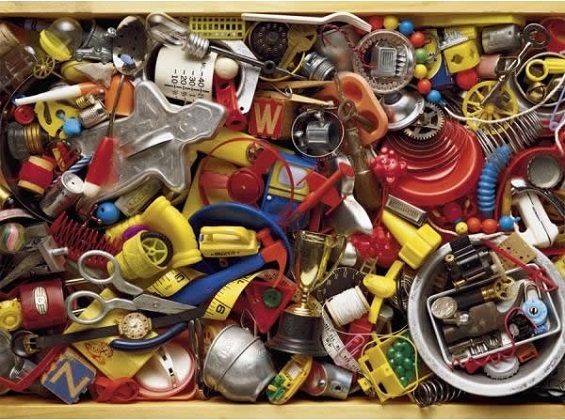Kipple

Watching a 1994 Arena film about Philip K. Dick and — bang — they bring up kipple.
Kipple is a word invented by Dick to describe the sort of detritus that accumulates around you almost without your notice. He means things like half-burned tea lights, light bulbs which may or may not work, and nice pens for which you long ago ran out of ink. They’re there now, haunting the backs of drawers.
In case you’re wondering, this is an ever-so-slightly different sort of clutter to dark matter.
I once started an essay for New Escapologist called War On Kipple in which I’d describe the kipple problem and offer tips on how to keep kipple at bay. I ditched it because there are topics other than minimalsm to write about in Escapology, and even within minimalism kipple is a smaller problem than, say, houses and cars and storage units. It was also too easy to come across as a fascist when talking about the abolition of kipple: does purity matter, ever? Is a maniacal purge of the kipple universe necessary? Maybe there are ways of resolving these questions but this was the line of thinking that made me ditch the essay.
Kipple struck me as an odd thing to include in a documentary about Philip K. Dick in which you’ve only got an hour to play with, so maybe minimalism and entropy have a wider appeal as subjects than I thought.
So if you’re interested in kipple, here’s the discussion about it from Do Androids Dream of Electric Sheep?:
“Kipple is useless objects, like junk mail or match folders after you use the last match or gum wrappers or yesterday’s homeopape. When nobody’s around, kipple reproduces itself. For instance, if you go to bed leaving any kipple around your apartment, when you wake up the next morning there’s twice as much of it. It always gets more and more.”
“I see.” The girl regarded him uncertainly, not knowing whether to believe him. Not sure if he meant it seriously.
“There’s the First Law of Kipple,” he said. “‘Kipple drives out nonkipple.’ Like Gresham’s law about bad money. And in these apartments there’s been nobody here to fight the kipple.”
“So it has taken over completely,” the girl finished. She nodded. “Now I understand.”
“Your place, here,” he said, “this apartment you’ve picked — it’s too kipple-ized to live in. We can roll the kipple-factor back; we can do like I said, raid the other apts. But — ” He broke off.
“But what?”
Isidore said, “We can’t win.”
“Why not?” […]
“No one can win against kipple,” he said, “except temporarily and maybe in one spot, like in my apartment I’ve sort of created a stasis between the pressure of kipple and nonkipple, for the time being. But eventually I’ll die or go away, and then the kipple will again take over. It’s a universal principle operating throughout the universe; the entire universe is moving toward a final state of total, absolute kippleization.”
★ The post-print phase of New Escapologist is just beginning. Go here to join in.
★ You can also buy all thirteen issues in print or PDF (in newly discounted £20 bargain bundles) at the shop.




Well. That’s depressing. I still think we can win this war.
I don’t let things touch the sides, jettisoning most kipply things immediately despite their potential. Don’t hold much truck with “maybe it’ll be useful some day.” Occasionally I regret it, but not often. The overall effect is less bandwidth spent on remembering whether something is or isn’t in the junk drawer.